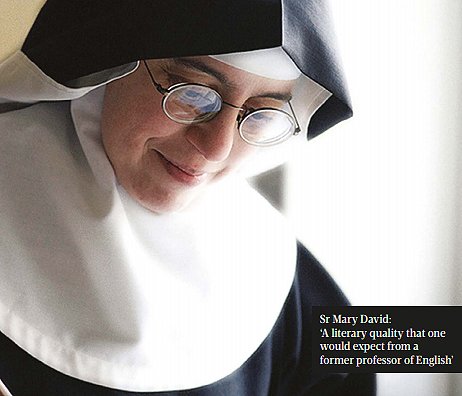Mercy and overwhelming love: Testament to a short life that bore great fruit

THE LAST TIME I spoke with Sr Mary David, a member of the Benedictine community of St Cecilia’s Abbey on the Isle of Wight, she told me how she had prayed in 2010 for my recovery from a cancer that is fatal more often than not. She had insisted that God show me mercy. As this book tells, a very short time later she was dead from the cancer from which she herself was suffering. The Rule of Saint Benedict says that length of days is given for amendment of life. Sr Mary David’s life was shorter than mine. Clearly it did not need amending. The evidence for this has now been published.
The substance of these, her collected writings, takes the form of notes written to the novices at St Cecilia’s, often on the back of used Christmas cards, and her talks to them. This is in a sense a work of her whole community, since the sisters to whom the notes correcting their personal faults were written generously made them available, and Sr Elizabeth, who was first Sr Mary David’s novice and then, at the end, the infirmarian who cared for her, has arranged them skilfully into sections reflecting the progress of a soul.
They show Sr Mary David at work at the coal face of sisters’ souls, laboriously but lovingly guiding to them to a greater unselfishness and so to a greater happiness. Although not intended for publication, they have the literary quality that one would expect from a former professor of English, as Sr Mary David was. She sees religious life as being “called to joy”, the title of the first, introductory, part.
Here she teaches that “joy means loving someone”. It is as easy, and as difficult, as that. As the path to this joy is traced, we are given some precautions, for example: “If we put a divine burden on the shoulders of any human being, those shoulders will break and we shall be disappointed.” So we need God. The way in which cloistered life directs us to the fulfilment of this need is articulated with admirable simplicity in the words: “Reality heals”. The realisation of this blessed healing comes from a commitment “unfolding through time” which accepts as normal “alternating weathers” of easy and difficult times.
Growth in love – “the health of the soul” – comes from receiving joyfully what God sends. Her personal advice about this is universally valid and merits extensive quotation: “There’s no need to be at war about everything. Try receiving things as a gift, try to enjoy and give a positive interpretation to whatever you might be feeling resistance to.
Believe me, you will become a different person. Go towards whatever is coming, announced – it is coming from God. Go along with things, people, circumstances. It’s your resistance that is causing you so much distress and pain and not the issues themselves.” The way to holiness is simple: “Want it.”
THE QUEST to enter into God’s freedom through a bond of love with him is helped by a practical distinction between reacting (replying “in a thoughtless, mechanical, impulsive manner”) and responding (finding “meaning in a situation in the light of the Gospel”). We can choose how we take what comes our way: “Our difficulties, whatever they may be, can all be used.” For this, “we need to develop a robust faith in providence”, never letting go of the belief that God is “the All-good”. With such a conviction, the one seeking holiness “can be fully himself with God and God can be fully himself with him: mercy and overwhelming love”. The seeker can hear with trust the voice of Christ saying “I am love in all things”. This is a voice Sr Mary David herself heard and responded to, writing to her family and friends towards the end: All that I have done in my life I have done for Love, and this Love is not an abstract reality but a Person, Jesus Christ, to whom I vowed my life on my Profession day.”
These writings, somewhat redolent of those of St Thérèse (who is often cited), are bookended by two compositions by other hands.
Abbot Erik Varden supplies a foreword which is a meditation on Sr Mary David’s life in the light of biblical texts about her patron and Sr Elizabeth gives a most moving account of her final days, with an apt summary of what she undertook: “Radiating God’s joy was the mission of her life.” That joy was indeed found in loving people, for she was able to say of her community: “They were for me a little part of Heaven.”


 Votes : 0
Votes : 0









